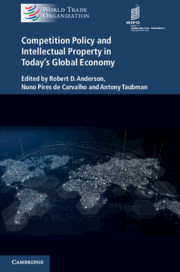Book contents
- Frontmatter
- Contents
- Tables
- Figures
- Boxes
- Contributors
- Preface
- Editorial Note
- 1 Introduction: Towards a Fresh Contribution to a Critical Policy Dialogue
- Part I Setting the Scene: Evolution of Key Principles and International Dialogue
- Part II Sharpening the Focus: Sectoral Perspectives
- Part III Deepening the Dialogue: Comparative and Jurisdictional Analyses
- Part IV Drawing the Lessons: Towards International Policy Coherence
- Index
6 - The Competition Policy Roots of Intellectual Property Law: A Reflection
from Part I - Setting the Scene: Evolution of Key Principles and International Dialogue
Published online by Cambridge University Press: 04 June 2021
- Frontmatter
- Contents
- Tables
- Figures
- Boxes
- Contributors
- Preface
- Editorial Note
- 1 Introduction: Towards a Fresh Contribution to a Critical Policy Dialogue
- Part I Setting the Scene: Evolution of Key Principles and International Dialogue
- Part II Sharpening the Focus: Sectoral Perspectives
- Part III Deepening the Dialogue: Comparative and Jurisdictional Analyses
- Part IV Drawing the Lessons: Towards International Policy Coherence
- Index
Summary
This chapter provides a brief sketch of the historical development of intellectual property (IP) law, situating its origins within the same, broader policy context that also gave rise to contemporary competition (or ‘antitrust’) policy. It aims to give background and perspective to the broader endeavour, manifested in the present volume, of progressing towards a broader, better integrated and systemic understanding of the relationship between IP and competition policy, centred on a coherent approach to domestic policymaking and regulation of the market to promote social and economic welfare. In briefly reviewing some of the key features of the early development of the law in one specific legal tradition, however, it does not pretend to be a comprehensive, representative or authoritative historical account. This chapter is therefore not a work of original scholarship but is rather a reflective essay. At most, therefore, it attempts to inform and stimulate discussion about the more deep-rooted policy (and sometimes, by the same token, less immediately visible) considerations that have shaped, and today continue to shape, IP and competition policy, as two complex, specialized and highly focused, but closely intertwined, legal and regulatory systems. A major limitation and shortcoming of the chapter is its focus on the roots of the common law tradition, particularly English law: this should not be seen as privileging or endorsing that particular tradition, but as merely putting it forward as one illustrative case study, albeit one tradition that has been influential in the formation of the law in a number of other jurisdictions.
- Type
- Chapter
- Information
- Publisher: Cambridge University PressPrint publication year: 2021



